2024年中考英语常用句型结构(四)课件 (共31张PPT)
文档属性
| 名称 | 2024年中考英语常用句型结构(四)课件 (共31张PPT) | 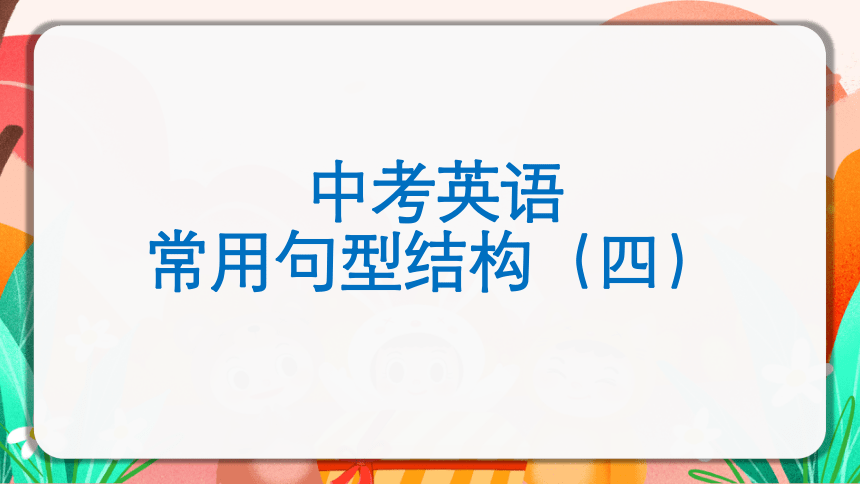 | |
| 格式 | pptx | ||
| 文件大小 | 50.5MB | ||
| 资源类型 | 教案 | ||
| 版本资源 | 通用版 | ||
| 科目 | 英语 | ||
| 更新时间 | 2024-06-10 16:03:19 | ||
图片预览

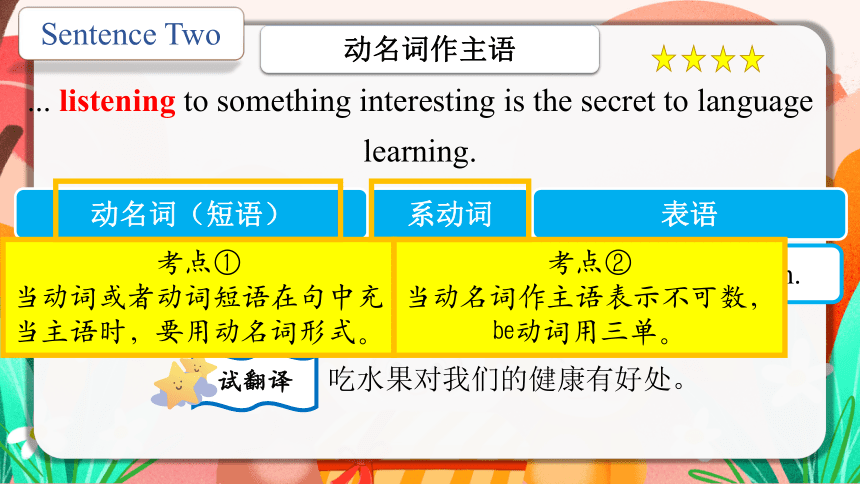
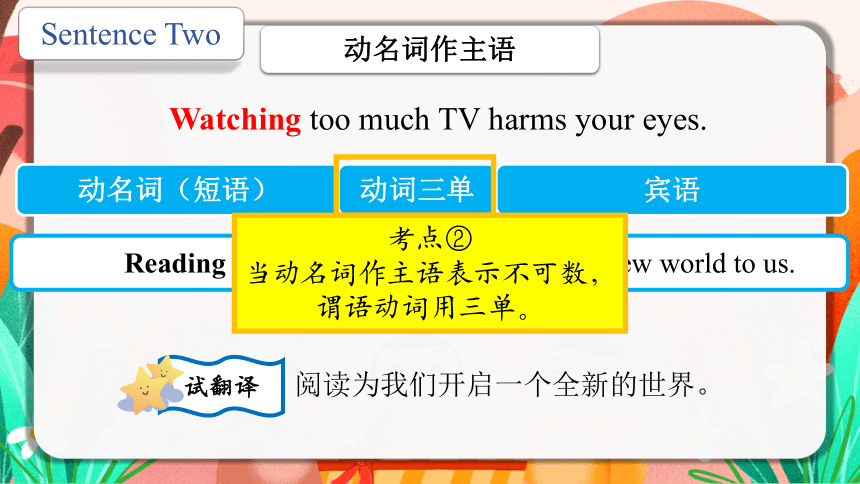
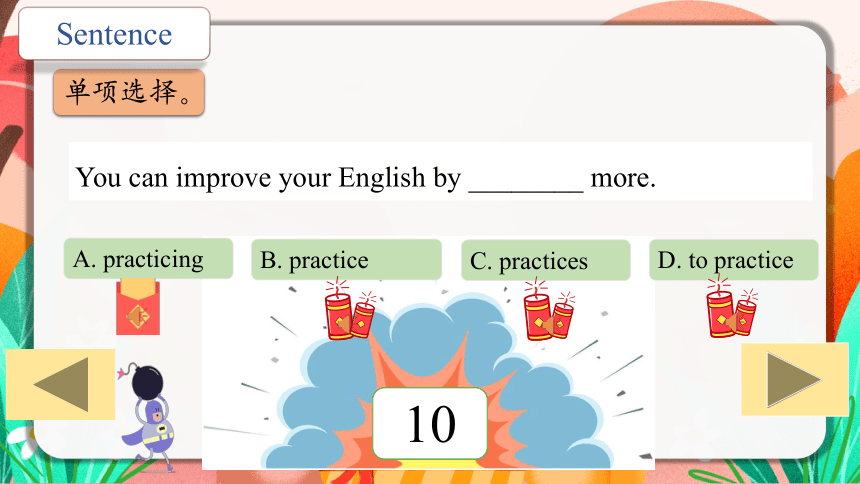
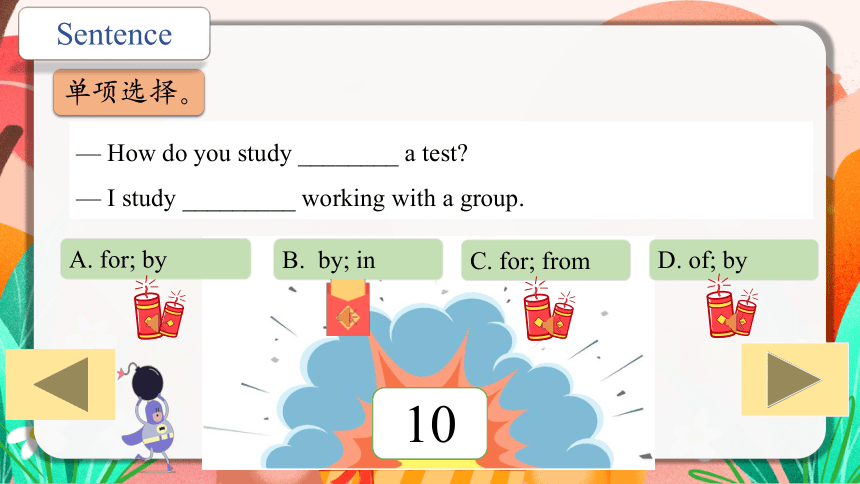
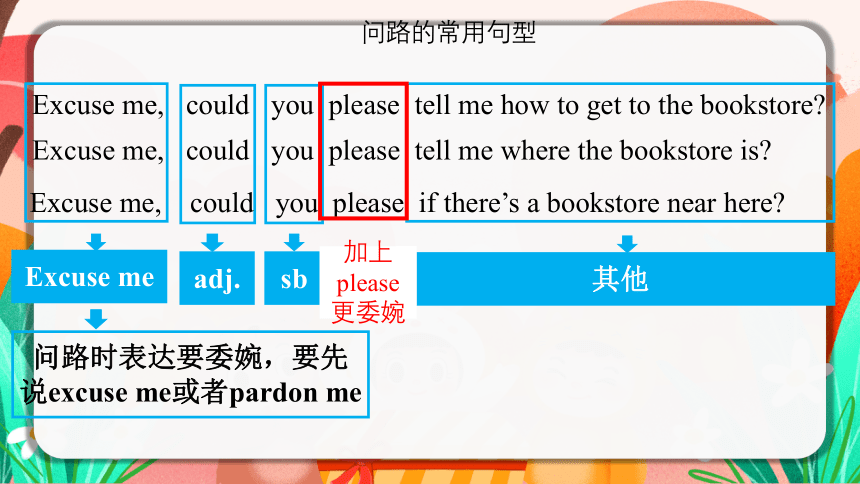
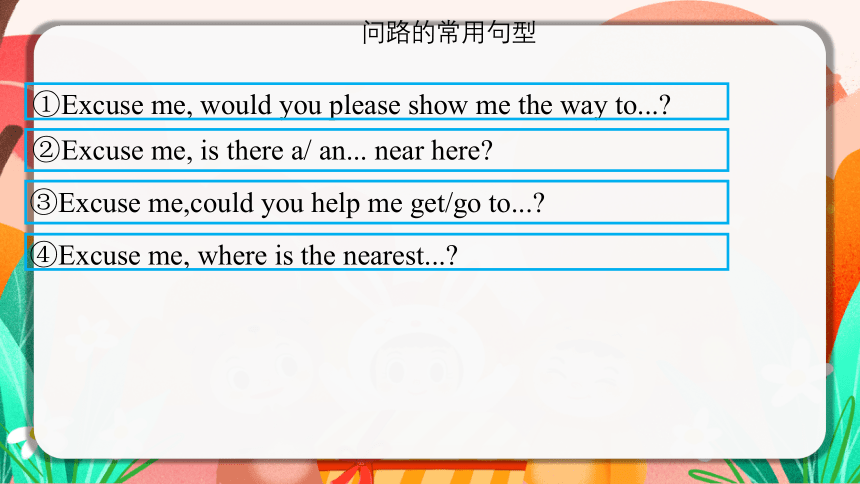
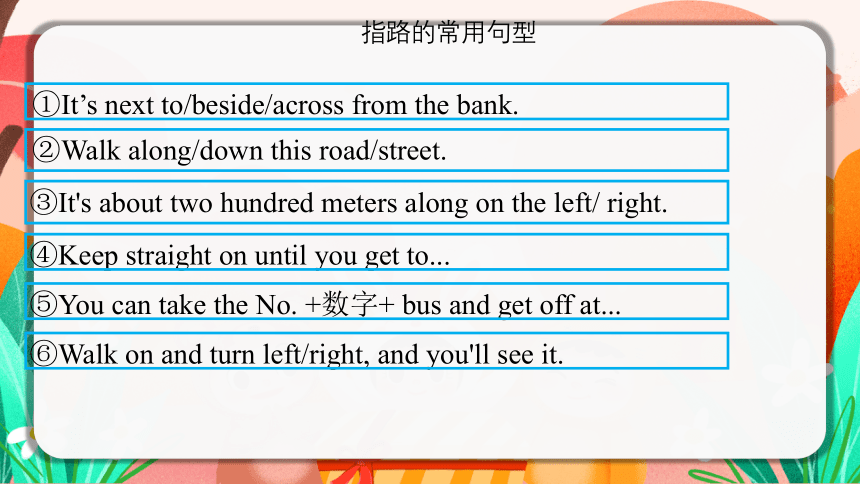
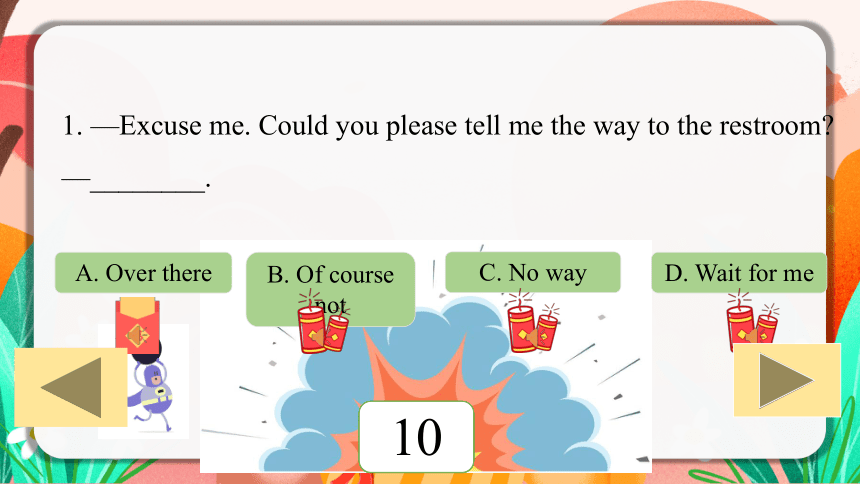
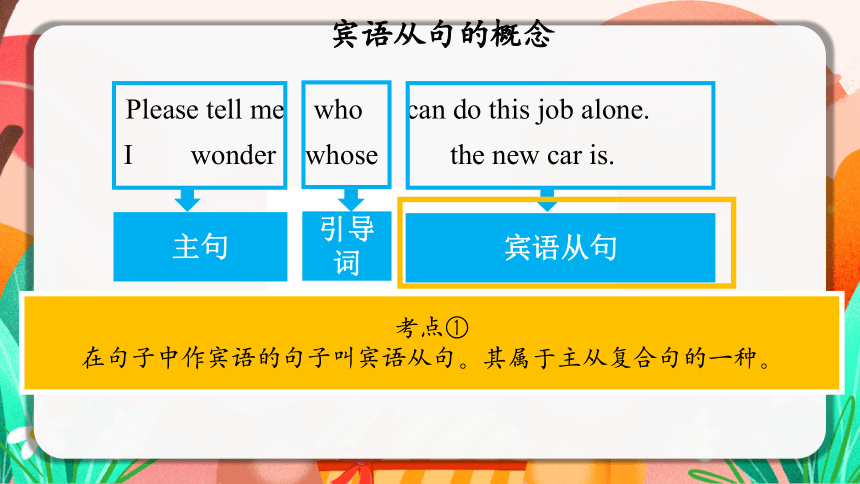
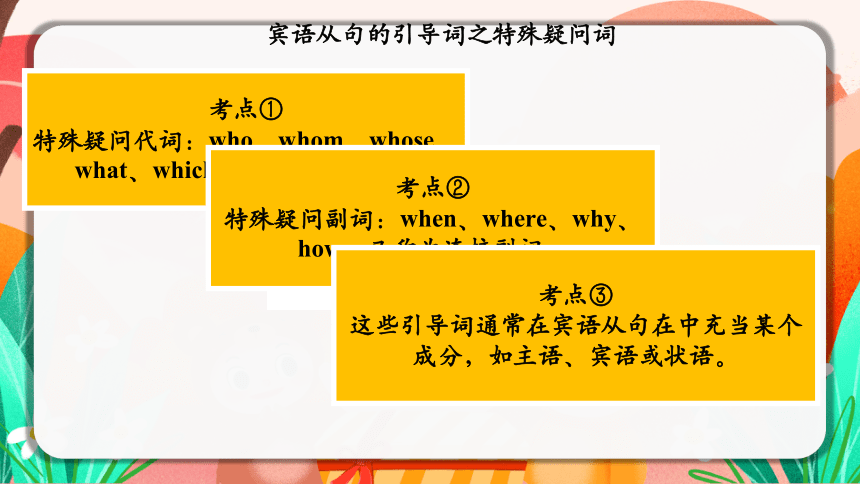
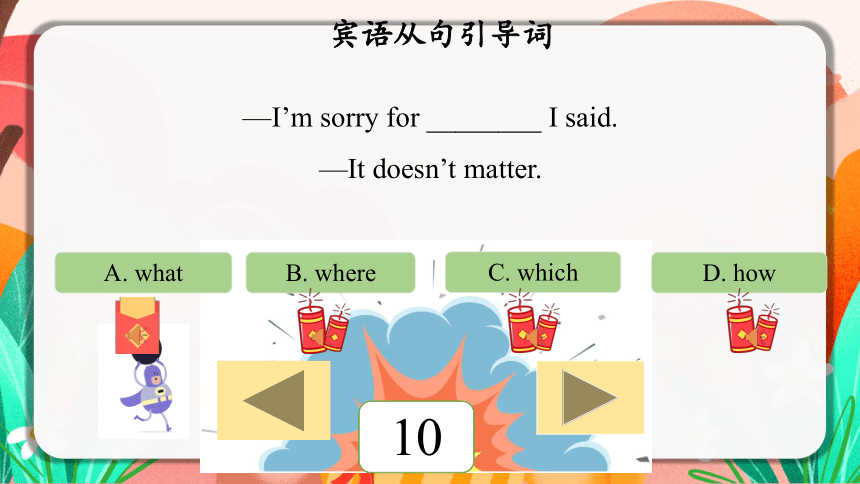
文档简介
(共31张PPT)
中考英语
常用句型结构(四)
Sentence Two
动名词作主语
... listening to something interesting is the secret to language learning.
吃水果对我们的健康有好处。
试翻译
Eating fruit(s)
is
动名词(短语)
系动词
表语
good for our health.
考点①
当动词或者动词短语在句中充当主语时,要用动名词形式。
考点②
当动名词作主语表示不可数,be动词用三单。
Sentence Two
动名词作主语
Watching too much TV harms your eyes.
阅读为我们开启一个全新的世界。
试翻译
Reading
opens up
a whole new world to us.
动名词(短语)
动词三单
宾语
考点②
当动名词作主语表示不可数,谓语动词用三单。
You can improve your English by ________ more.
0
1
2
3
4
5
6
7
8
9
10
B. practice
A. practicing
D. to practice
C. practices
单项选择。
Sentence
— How do you study ________ a test
— I study _________ working with a group.
0
1
2
3
4
5
6
7
8
9
10
A. for; by
B. by; in
D. of; by
C. for; from
单项选择。
Sentence
问路的常用句型
Excuse me, could you please tell me how to get to the bookstore
Excuse me, could you please tell me where the bookstore is
Excuse me
adj.
sb
其他
问路时表达要委婉,要先说excuse me或者pardon me
Excuse me, could you please if there’s a bookstore near here
加上please更委婉
问路的常用句型
④Excuse me, where is the nearest...
①Excuse me, would you please show me the way to...
②Excuse me, is there a/ an... near here
③Excuse me,could you help me get/go to...
指路的常用句型
④Keep straight on until you get to...
①It’s next to/beside/across from the bank.
②Walk along/down this road/street.
③It's about two hundred meters along on the left/ right.
⑤You can take the No. +数字+ bus and get off at...
⑥Walk on and turn left/right, and you'll see it.
0
1
2
3
4
5
6
7
8
9
10
B. Of course not
D. Wait for me
C. No way
A. Over there
1. —Excuse me. Could you please tell me the way to the restroom
—________.
宾语从句的概念
Please tell me who can do this job alone.
I wonder whose the new car is.
主句
引导词
宾语从句
考点①
在句子中作宾语的句子叫宾语从句。其属于主从复合句的一种。
宾语从句的引导词之特殊疑问词
考点①
特殊疑问代词:who、whom、whose、what、which,又称为连接代词
考点②
特殊疑问副词:when、where、why、how,又称为连接副词。
考点③
这些引导词通常在宾语从句在中充当某个成分,如主语、宾语或状语。
0
1
2
3
4
5
6
7
8
9
10
B. where
D. how
C. which
A. what
—I’m sorry for ________ I said.
—It doesn’t matter.
宾语从句引导词
0
1
2
3
4
5
6
7
8
9
10
A. that
D. which
C. whose
B. who
—Could you tell me ________ she is looking for
—Her cousin, Susan.
宾语从句引导词
辨析
1.be used to + n. /pron./doing
2. get used to sth./doing sth.
become used to sth./doing sth.
Language points
Point
意为“习惯于……”,to是介词,后接名 词、代词或动名词。可用于各种 时态。
意为“逐渐习惯于……”,
强调这一习惯的过程,to是介词。
He is used to getting up early.
他习惯于早起。
He gets used to getting up early.
他逐渐习惯于早起。
辨析
3. be used to do
4.be used for doing sth.
Language points
Point
意为“被用来做……”,
被动语态结构,to后跟动词原形。
意为“被用来……”,
介词for表示功能、用途。
Water is used to make drinks.
水被用来做饮料。
Nickel can be used for making coins.镍可做成钱币。
完成下列句子
let’s practice
1. 我以前害怕在公众前演讲。
I _____ ______ be afraid of ______ a
speech in _______.
2. 这种狗是用来帮助盲人的吗?
Are those dogs _____ _____ _____ the
blind
used to
giving
public
used to help
完成下列句子
let’s practice
3. 你表妹以前害怕独自一人,不是吗?
Your cousin _______ ____ be afraid
of ______ alone, _______ she
4. 珍妮以前在学校里并不受欢迎。
Jenny ______ _____ ___ be popular in
school.
5. 我不习惯午饭吃这么多。
I’m _______ used to _________ so much
at lunch time.
used to
being
didn’t
didn’t use to
not
eating
一般现在时的被动语态:一般疑问句
Is it made of silver
Are the shirts made of cotton?
Is/Are
主语
动词过去分词
视时间和主语而定
一般过去时的被动语态:肯定句
It was made in Thailand.
They were made in Thailand.
主语
was/were
动词过去分词
视时间和主语而定
一般现在时的被动语态:肯定句
The tea is sent to many different countries and places.
... they are picked by hand.
主语
is/am/are
动词过去分词
被动语态的主语是动作承受者,by后强调的是动作执行者是什么
by+动作执行者
视时间和主语而定
0
1
2
3
4
5
6
7
8
9
10
A. are invited
D. were invited
C. was invited
B. am invited
—Will you come to Tom’s birthday party tomorrow
—I will, if I ________.
被动语态
0
1
2
3
4
5
6
7
8
9
10
B. produced
D. is producing
C. produces
A. is produced
—What’s the name of this tea It tastes fantastic.
—lt’s Biluochun, a kind of green tea. It ________ in Suzhou.
被动语态
一般现在时的被动语态:一般疑问句
Is it made of silver
Are the shirts made of cotton?
Is/Are
主语
动词过去分词
视时间和主语而定
一般过去时的被动语态:肯定句
It was made in Thailand.
They were made in Thailand.
主语
was/were
动词过去分词
视时间和主语而定
一般现在时的被动语态:肯定句
The tea is sent to many different countries and places.
... they are picked by hand.
主语
is/am/are
动词过去分词
被动语态的主语是动作承受者,by后强调的是动作执行者是什么
by+动作执行者
视时间和主语而定
0
1
2
3
4
5
6
7
8
9
10
A. are invited
D. were invited
C. was invited
B. am invited
—Will you come to Tom’s birthday party tomorrow
—I will, if I ________.
被动语态
0
1
2
3
4
5
6
7
8
9
10
B. produced
D. is producing
C. produces
A. is produced
—What’s the name of this tea It tastes fantastic.
—lt’s Biluochun, a kind of green tea. It ________ in Suzhou.
被动语态
no matter
与“what, who, which, where, how”等疑问词连用,引导让步状语从句。
e.g. No matter how well you know this city, it is easy to get lost.
不论你多么熟悉这座城市,都容易迷路。
No matter what else is served, there is always rice.
不管上的是什么菜,总是有米饭。
注意:
no matter+特殊疑问词=特殊疑问词ever
无论……
区别:
no matter what:只能用来引导让步状语从句。
whatever:可以引导让步状语从句,也可引导名词性从句
e.g.Whatever she did was right.她做的一切都是对的。
1.No matter ______you leave, please tell me and I will see you off.
A.what B.when C.how D. why
2.________you want to eat, I will cook for you, my son.
A.No matter where B .No matter how
C.No matter what D . No matter when
thanks
中考英语
常用句型结构(四)
Sentence Two
动名词作主语
... listening to something interesting is the secret to language learning.
吃水果对我们的健康有好处。
试翻译
Eating fruit(s)
is
动名词(短语)
系动词
表语
good for our health.
考点①
当动词或者动词短语在句中充当主语时,要用动名词形式。
考点②
当动名词作主语表示不可数,be动词用三单。
Sentence Two
动名词作主语
Watching too much TV harms your eyes.
阅读为我们开启一个全新的世界。
试翻译
Reading
opens up
a whole new world to us.
动名词(短语)
动词三单
宾语
考点②
当动名词作主语表示不可数,谓语动词用三单。
You can improve your English by ________ more.
0
1
2
3
4
5
6
7
8
9
10
B. practice
A. practicing
D. to practice
C. practices
单项选择。
Sentence
— How do you study ________ a test
— I study _________ working with a group.
0
1
2
3
4
5
6
7
8
9
10
A. for; by
B. by; in
D. of; by
C. for; from
单项选择。
Sentence
问路的常用句型
Excuse me, could you please tell me how to get to the bookstore
Excuse me, could you please tell me where the bookstore is
Excuse me
adj.
sb
其他
问路时表达要委婉,要先说excuse me或者pardon me
Excuse me, could you please if there’s a bookstore near here
加上please更委婉
问路的常用句型
④Excuse me, where is the nearest...
①Excuse me, would you please show me the way to...
②Excuse me, is there a/ an... near here
③Excuse me,could you help me get/go to...
指路的常用句型
④Keep straight on until you get to...
①It’s next to/beside/across from the bank.
②Walk along/down this road/street.
③It's about two hundred meters along on the left/ right.
⑤You can take the No. +数字+ bus and get off at...
⑥Walk on and turn left/right, and you'll see it.
0
1
2
3
4
5
6
7
8
9
10
B. Of course not
D. Wait for me
C. No way
A. Over there
1. —Excuse me. Could you please tell me the way to the restroom
—________.
宾语从句的概念
Please tell me who can do this job alone.
I wonder whose the new car is.
主句
引导词
宾语从句
考点①
在句子中作宾语的句子叫宾语从句。其属于主从复合句的一种。
宾语从句的引导词之特殊疑问词
考点①
特殊疑问代词:who、whom、whose、what、which,又称为连接代词
考点②
特殊疑问副词:when、where、why、how,又称为连接副词。
考点③
这些引导词通常在宾语从句在中充当某个成分,如主语、宾语或状语。
0
1
2
3
4
5
6
7
8
9
10
B. where
D. how
C. which
A. what
—I’m sorry for ________ I said.
—It doesn’t matter.
宾语从句引导词
0
1
2
3
4
5
6
7
8
9
10
A. that
D. which
C. whose
B. who
—Could you tell me ________ she is looking for
—Her cousin, Susan.
宾语从句引导词
辨析
1.be used to + n. /pron./doing
2. get used to sth./doing sth.
become used to sth./doing sth.
Language points
Point
意为“习惯于……”,to是介词,后接名 词、代词或动名词。可用于各种 时态。
意为“逐渐习惯于……”,
强调这一习惯的过程,to是介词。
He is used to getting up early.
他习惯于早起。
He gets used to getting up early.
他逐渐习惯于早起。
辨析
3. be used to do
4.be used for doing sth.
Language points
Point
意为“被用来做……”,
被动语态结构,to后跟动词原形。
意为“被用来……”,
介词for表示功能、用途。
Water is used to make drinks.
水被用来做饮料。
Nickel can be used for making coins.镍可做成钱币。
完成下列句子
let’s practice
1. 我以前害怕在公众前演讲。
I _____ ______ be afraid of ______ a
speech in _______.
2. 这种狗是用来帮助盲人的吗?
Are those dogs _____ _____ _____ the
blind
used to
giving
public
used to help
完成下列句子
let’s practice
3. 你表妹以前害怕独自一人,不是吗?
Your cousin _______ ____ be afraid
of ______ alone, _______ she
4. 珍妮以前在学校里并不受欢迎。
Jenny ______ _____ ___ be popular in
school.
5. 我不习惯午饭吃这么多。
I’m _______ used to _________ so much
at lunch time.
used to
being
didn’t
didn’t use to
not
eating
一般现在时的被动语态:一般疑问句
Is it made of silver
Are the shirts made of cotton?
Is/Are
主语
动词过去分词
视时间和主语而定
一般过去时的被动语态:肯定句
It was made in Thailand.
They were made in Thailand.
主语
was/were
动词过去分词
视时间和主语而定
一般现在时的被动语态:肯定句
The tea is sent to many different countries and places.
... they are picked by hand.
主语
is/am/are
动词过去分词
被动语态的主语是动作承受者,by后强调的是动作执行者是什么
by+动作执行者
视时间和主语而定
0
1
2
3
4
5
6
7
8
9
10
A. are invited
D. were invited
C. was invited
B. am invited
—Will you come to Tom’s birthday party tomorrow
—I will, if I ________.
被动语态
0
1
2
3
4
5
6
7
8
9
10
B. produced
D. is producing
C. produces
A. is produced
—What’s the name of this tea It tastes fantastic.
—lt’s Biluochun, a kind of green tea. It ________ in Suzhou.
被动语态
一般现在时的被动语态:一般疑问句
Is it made of silver
Are the shirts made of cotton?
Is/Are
主语
动词过去分词
视时间和主语而定
一般过去时的被动语态:肯定句
It was made in Thailand.
They were made in Thailand.
主语
was/were
动词过去分词
视时间和主语而定
一般现在时的被动语态:肯定句
The tea is sent to many different countries and places.
... they are picked by hand.
主语
is/am/are
动词过去分词
被动语态的主语是动作承受者,by后强调的是动作执行者是什么
by+动作执行者
视时间和主语而定
0
1
2
3
4
5
6
7
8
9
10
A. are invited
D. were invited
C. was invited
B. am invited
—Will you come to Tom’s birthday party tomorrow
—I will, if I ________.
被动语态
0
1
2
3
4
5
6
7
8
9
10
B. produced
D. is producing
C. produces
A. is produced
—What’s the name of this tea It tastes fantastic.
—lt’s Biluochun, a kind of green tea. It ________ in Suzhou.
被动语态
no matter
与“what, who, which, where, how”等疑问词连用,引导让步状语从句。
e.g. No matter how well you know this city, it is easy to get lost.
不论你多么熟悉这座城市,都容易迷路。
No matter what else is served, there is always rice.
不管上的是什么菜,总是有米饭。
注意:
no matter+特殊疑问词=特殊疑问词ever
无论……
区别:
no matter what:只能用来引导让步状语从句。
whatever:可以引导让步状语从句,也可引导名词性从句
e.g.Whatever she did was right.她做的一切都是对的。
1.No matter ______you leave, please tell me and I will see you off.
A.what B.when C.how D. why
2.________you want to eat, I will cook for you, my son.
A.No matter where B .No matter how
C.No matter what D . No matter when
thanks
同课章节目录
